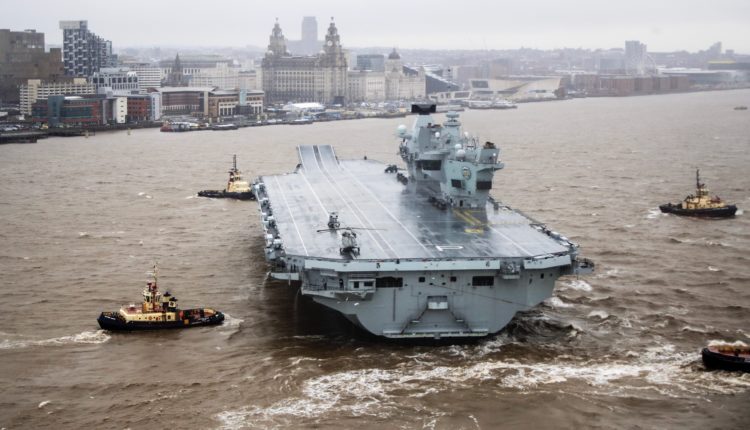Why a strong Royal Navy is critical to our economy
50% of the UK’s energy & food, 95% of our trade and 97% of our data come via the sea – Royal Navy Regional Commander Tom Knowles tells Liverpool city region maritime industry leaders why ‘safe access to the sea’ is critical. Tony McDonough reports
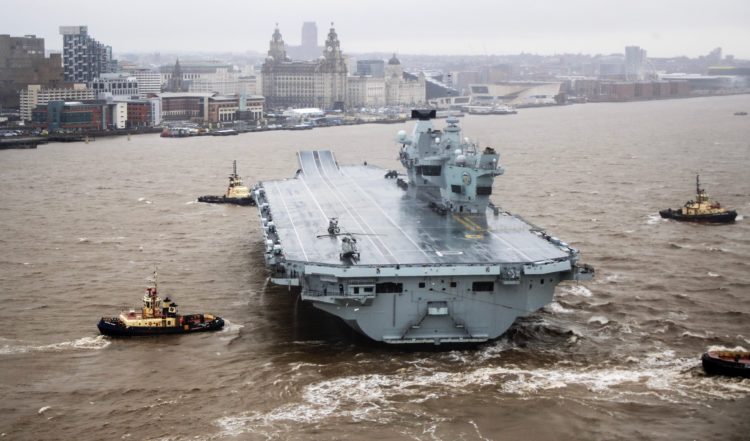
Defence spending can be a contentious issue and people will often ask why should we spend more on the military when there are other pressing domestic issues?
Commodore Tom Knowles, Royal Navy Regional Commander for Northern England and the Isle of Man, offered a very clear answer to this question when he addressed leaders from the Liverpool city region maritime sector.
“As an island nation we depend on the sea for our prosperity. So it is a reminder of how important safe access to the sea is to the life that we know and enjoy,” said Commodore Knowles.
He added: “But the maritime network is not just vital to the life we know, it is also really fragile. We rely on a just-in-time delivery system. According to the United Nations, without international shipping half the world would freeze and half the world would starve.
Commodore Knowles was speaking at the Mersey Maritime monthly Face-2-Face networking event which in July was held at HMS Eaglet, a Royal Navy Reserve headquarters in Liverpool.
He praised those businesses and organisations that support the armed forces either by employing ex service personnel or current reservists. And he asked for more dialogue with local maritime businesses on skills development.
Protecting the UK’s lifelines
The Royal Navy, both within the UK’s own territorial waters and across the globe, is working 24/7 to keep us safe but also protect global shipping and the underwater cables that are now our digital lifeline, explained Commodore Knowles.
“If you remember the blockage of the Suez Canal in 2021. That led to disruptions that cost more than $9bn a day in lost international trade. Just last year the Shetland Islands were digitally cut off by damage to the undersea cables,” he said.
“Every day, half of our energy and food, 95% of our trade comes and goes by sea. 97% of all of our data comes in via underwater cables. Every aspect of modern Britain depends on the water that surrounds us. That is our connection with the wider world.
“The UK has the fifth-largest exclusive economic zone. Within that we have oil reserves in the North Sea and off the Falkland Islands. We have a £1.4bn fishing industry and a third of Europe’s offshore wind resource.”
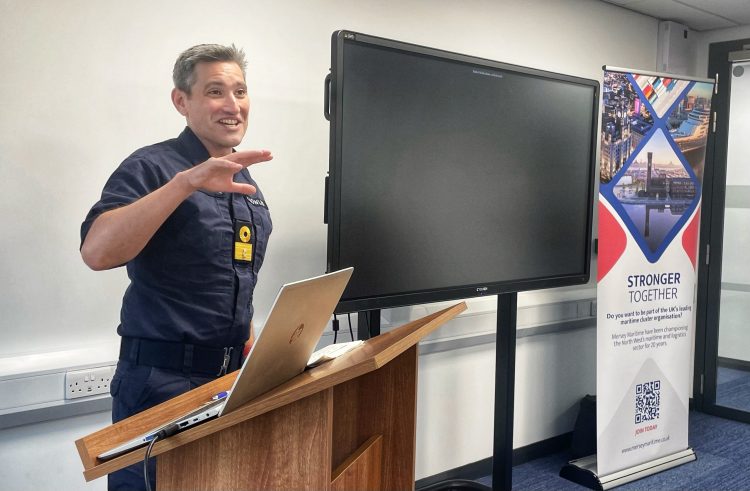
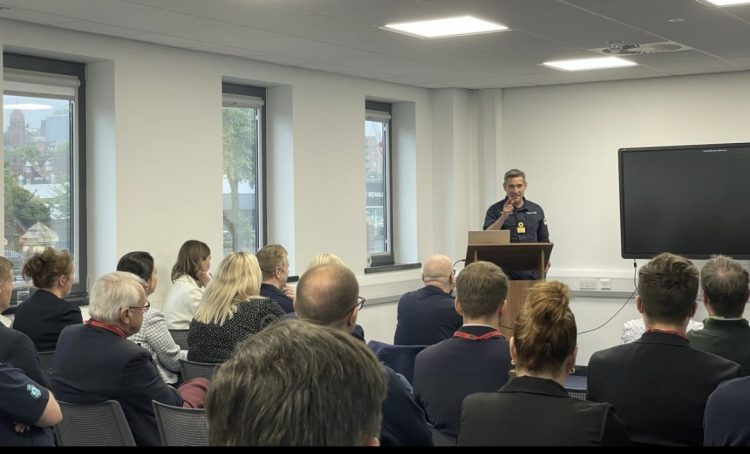
Commodore Knowles spoke of the growing threats and dangers to our wellbeing and prosperity on the “high seas”, those areas across the globe over which no country has territorial control.
It is an area covering more than half the world’s surface and that is regulated by UNCLOS (United Nations Convention on the Law of the Sea) rules. The UK has played a key role in formulating these rules and making sure they are adhered to.
However, Commodore Knowles added: “Those rules and the shipping network they protect are under constant threat. Numerous countries refuse to ratify UNCLOS. Others have ratified it but are violating it in order to bolster their own economic zone claims
“Where there are opportunities for trade so there are nations vying for resource and dominance.
“This competition for control is growing, from European disputes in the Mediterranean all the way through to the Indo-Pacific, Governments are competing over waters containing key global supply chains.
“In our modern world global maritime trade goes hand in hand with global competition. And given how vital and valuable the sea is to the world’s economy this is no surprise.
“The biggest weakness in the system is the eight strategic choke points. These are bottlenecks on our essential trade routes. They are vulnerable to war, piracy and terrorism.
“If they are compromised the global supply chain of food, energy and trade could be thrown into disarray and prices could skyrocket. We have seen this recently.
“It is not just our physical imports and exports. There is also the internet that we depend on so much. 97% of data is carried via the network of underwater cables and these stretch some 1.2m km.
“Your banking, your shopping, your social media accounts… whatever it is that is really important depends on those cables. And if they were compromised only 3% of what they carry could be transferred to satellites.”
‘Our data is not in the cloud… it’s under the sea’
Commodore Knowles offered examples of where countries had been cut off for days due to cable disruption. Natural disasters and accidents are threats but he added there were “numerous states” developing technologies to interfere with the cables.
“Think about it – websites down, credit card and cash machines not working, flights grounded,” he said: “To quote Google – ‘people think data is in the cloud, but it isn’t. It is in the ocean. It is not up there, it is down there, under the water, and it is vulnerable.
Commodore Knowles offered a detailed breakdown of the assets the Royal Navy deploys every day of the year to protect our interest. The navy’s surface fleet is headed by its two aircraft carriers, partially constructed at Cammell Laird in Birkenhead.
There are also troop-carrying landing ships, frigates, offshore patrol vessels and mine countermeasure vessels. The Royal Navy is also offering support to Ukraine following the invasion by Russia.
He added: “In the Caribbean a permanently deployed patrol ship provides support to the six British overseas territories fighting criminal activity and the global narcotics trade. Last year alone around £122m of illegal drugs were seized by Royal Navy vessels.
“This also means we can respond to the devastating effects of natural disasters in the region. Royal Navy and Royal Fleet Auxiliary vessels are deployed at the height of the hurricane season.
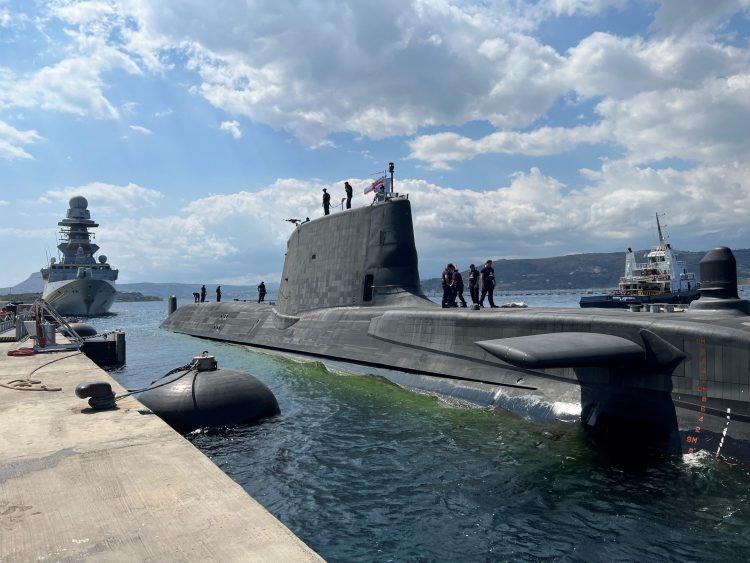
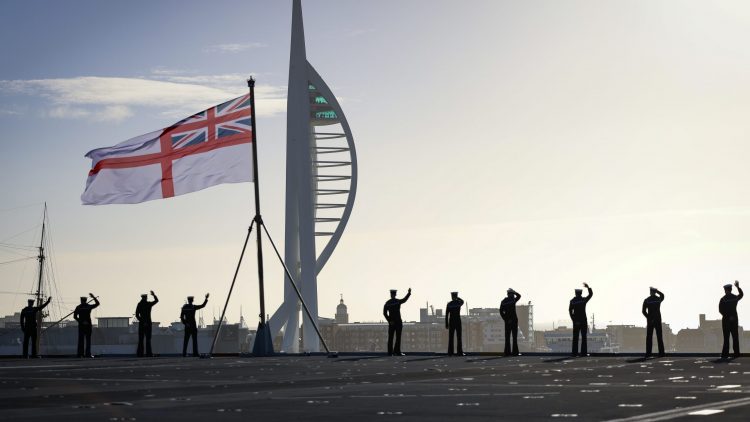
“Recently, Royal Navy warships provided defence for the merchant vessels passing Yemen. That operation the Royal Navy had never engaged in such high-intensity surface-to-air operations since the end of the end of WW2. That was real.
“Homeland security is an ongoing task. In 2010 the Royal Navy responded to one Russian naval entry into UK territorial waters. In 2020 we responded to 57. There have been 100 further entries in the past two years and unprecedented levels of submarine activity.
“This has included the first of Russia’s Yantar class intelligence ships. They have advanced mini submarine technology and are capable of disrupting undersea cables. Two more of those ships are currently under construction.
“So whether it is human dangers or natural disasters on land, at sea and in the air, protecting global Britain means protecting Britain at home. Four Vanguard nuclear submarines are permanently on patrol.”
Value of reservists
Commodore Knowles himself is a reservist, having joined the Royal Navy straight out of university 21 years ago.
He has had a parallel career as an archaeologist and says it is only through the co-operation of his civilian employer that he was able to fulfil his naval duty as a submarine controller. Now he works full-time for the navy.
“The MoD operates the Employer Recognition Scheme. This recognises the businesses actively demonstrating their support to the defence community,” he added. “The ultimate accolade is the Gold Level Award.
“There is also the Armed Forces Covenant, the Bronze and Silver Awards and it is a meaningful way in which organisations can demonstrate their support for the armed forces community. They help make defence of the real a truly whole force construct.
Commodore Knowles also introduced Lieutenant Commander Tom Pinfold, who has been appointed as a maritime enterprise officer. His job will be to liaise with the civilian pulley chain to share skills, experience and knowledge.
READ MORE: First Isle of Man vessel departs £70m Mersey terminal
READ MORE: Lady Dodd is tickled to see MAST ship set sail
Lt Cdr Pinfold said: “We are at a very interesting stage. We are looking at how industry, academia, innovation and tech firms and how they all fit together. As the end user, how can the Royal Navy support you?
“I want you to come and have a chat and meet people. I am here to support and help out where I can and be a friendly face of the Navy.”
Event hosts, Mersey Maritime, has recently joined 47 organisations from across the North West of England who have been awarded ‘Silver’ under the Ministry of Defence Employer Recognition Scheme in recognition of its support to Defence and the wider Armed Forces community. Click here to find out more.

